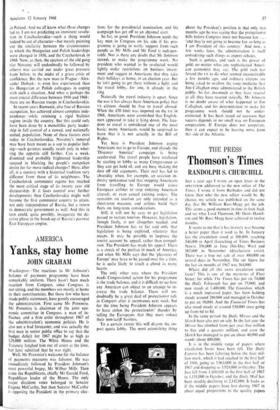Yanks, stay home
AMERICA JOHN GRAHAM
Washington—The reactions to Mr Johnson's balance of payments programme have been remarkably uniform. There hasn't been much reaction from Congress, since Congress is not sitting, and the members are mostly at home in their constituencies. But those few who have made public statements, have greatly encouraged the administration. First came Mr Proxmire. Mr Proxmire is chairman of the joint eco- nomic committee in Congress, a man of in- fluence, and a firm critic throughout 1967 of the administration's economic policies. He is also not a bad forecaster, and was actually the first man in senior public office to say that the budget deficit for 1967 might be as high as $29,000 million. The White House and the Treasury laughed him out of court at the time, but later admitted that he was right.
Well, Mr Proxmire's welcome for the balance of payments measures was fulsome. He was immediately followed by President Johnson's most powerful bogey, Mr Wilbur Mills. Then came the Republicans, chiefly Mr Gerald Ford, Republican leader of the House. The only major dissident voice belonged to Senator Eugene McCarthy, but then Senator McCarthy is opposing the President in the primary elec- -
tions for the presidential nomination, and his campaign has got off to an abysmal start.
So far, so good. President Johnson needs the key men in Congress on his side if his pro- gramme is going to work; support from such people as Mr Mills and Mr Ford is indispen- sable. Nor is there any doubt that Mr Johnson intends to make the programme work. No president who wanted to be re-elected would lightly order restrictions on business invest- ment and suggest to Americans that they take their holidays at home, in an election year. But he isn't going to get there without a fight, and the travel lobby, for one, is already in the ring.
Naturally the travel industry is upset. Since the war it has always been American policy that us citizens should be free to travel abroad. When the £50 limit was imposed on the UK in 1966, Americans were astonished that English- men appeared to take it lying down. The free- dom to travel is considered one of the most basic; many Americans would be surprised to learn that it is not actually in the Bill of Rights.
Yet here is President Johnson urging Americans not to go to Europe, and already the 'Discover America' campaign is being accelerated. The travel people have retaliated by starting to lobby as many Congressmen as they can get hold of, and are busy shaking the dust off old arguments. Their zeal has led to absurdity when, for example, an aviation in- dustry spokesman said that stopping Americans from travelling to Europe would cause EurOpean airlines to stop ordering American aircraft, or even cancel existing orders. The restraints on tourism are only intended as a short-term measure, and airlines build their fleets on long-term considerations.
Still, it will not be easy to get legislation passed to restrict tourism. However, legislation, though likely, is not altogether needed. and President Johnson has so far said only that legislation is being explored, whatever that means. It may be possible to improve the tourist account by appeal, rather than compul- sion. The President has made his appeal. There is a streak of the puritan in much of America. and when Mr Mills says that the 'pleasures of Europe' may have to be passed over for a time, he is quite likely to touch a chord in many hearts.
The only other area where the President need Congressional action for his programme is the trade balance, and it is difficult to see how any American can object to an attempt to in- crease the trade balance. There will un- doubtedly be a great deal of protectionist talk in Congress after it reconvenes next week, but for the time being President Johnson appears to have stolen the protectionists' thunder by telling the Europeans that they must reduce their non-tariff barriers.
To a certain extent this will disarm the im- port quota lobby. The most astonishing thing about the President's position is that only two months ago he was saying that tbe protectionist bills before Congress must not become law . 'and they're not going to become law so long as I am President of this country.' And now, a few weeks later, the administration is itself considering such things as export rebates.
Such is politics, and such is the power of gold, no matter what any sophisticated Ameri- can economist may say. The gold rush has forced the us to do what seemed inconceivable a few months ago, and ordinary citizens arc being asked to swallow the same medicine that Jim Callaghan once administered to the British public. So far, inasmuch as they have reacted at all, they have reacted stoically. Mr Johnson is no doubt aware of what happened to Jim Callaghan, and his determination to make his programme work should not be under- estimated. It has been stated ad nauseam that success depends in no small way on European cooperation. If Europe does not cooperate, then it can expect to be hearing more from this side of the Atlantic.






























 Previous page
Previous page